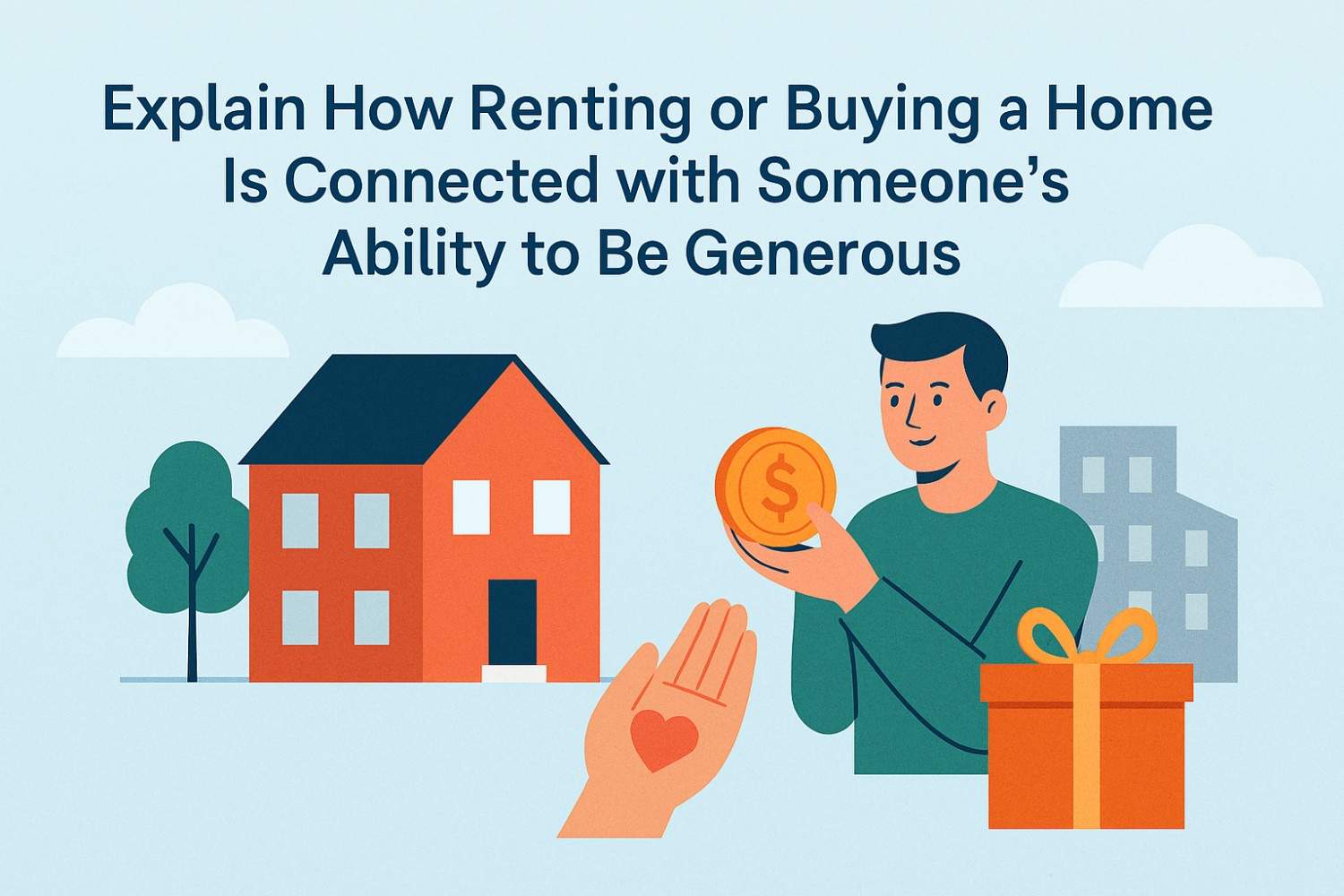Renting or buying a home is connected with someone’s ability to be generous because housing choices directly shape financial security, community involvement, and emotional stability. Homeowners often display higher levels of charitable giving, but renters, too, can demonstrate generosity through flexible finances and time commitments. In both cases, the type of housing influences how and why people give.
How Homeownership Can Inspire Greater Generosity

1. Financial stability and long-term wealth
Buying a home often builds financial security through equity growth. Over time, that stability can boost a homeowner’s confidence in donating or volunteering. Owning an appreciating asset creates both a psychological and financial cushion, allowing people to give more freely without fear of instability. Studies show that homeowners, on average, donate about 20% more than renters even after accounting for income and wealth.
2. Tax incentives that encourage giving
Many homeowners benefit from tax deductions for mortgage interest and property taxes. This financial advantage can increase disposable income, making charitable contributions easier. While taxes aren’t the sole reason for generosity, they reinforce the connection between homeownership and consistent giving habits.
3. Community ties and civic pride
Owning a home strengthens attachment to a neighborhood. Homeowners often stay longer, engage in local initiatives, and invest emotionally in their surroundings. That sense of belonging translates into community involvement—supporting local fundraisers, volunteering at schools, or joining neighborhood projects.
4. Sense of ownership and responsibility
Psychologically, homeownership creates a feeling of stewardship. When you have a direct financial and emotional stake in your community’s well-being, generosity becomes a natural extension of pride and care.
How Renting Can Also Encourage Generosity

1. Greater financial flexibility
Renting requires fewer upfront costs—no down payment, property taxes, or major repair bills. This liquidity leaves renters with more freedom to allocate funds toward charitable causes or savings. Predictable monthly expenses also make it easier to plan and budget for giving.
2. Opportunity to give through time and talent
Without the ongoing maintenance burden of homeownership, renters often have more time and energy for acts of generosity beyond money—like volunteering, mentoring, or supporting community initiatives.
3. Smarter use of liquid capital
Renters can redirect money that might have gone into a down payment toward investments, donations, or passion projects. When managed strategically, renting can support financial goals and philanthropic ambitions.
The Interplay Between Housing and Generosity
The link between housing status and generosity isn’t one-size-fits-all—it depends on personal goals, income, and lifestyle. For instance:
- A homeowner with an expensive mortgage may have less cash flow for charitable giving than a renter with fewer obligations.
- A long-term renter who values community may volunteer just as much—or more—than a homeowner.
- In high-cost cities, both renters and owners may limit donations simply to meet basic expenses.
In essence, generosity thrives when financial security and community connection align, regardless of housing type.
Why Housing Choices Shape Emotional Readiness to Give
Generosity isn’t only financial—it’s emotional. Homeowners often report a stronger sense of belonging and personal satisfaction, which can increase their willingness to help others. Renters, meanwhile, may find generosity easier when unburdened by large debts or home maintenance worries. Both housing paths influence how people feel about giving—their security, optimism, and social identity play a major role.
Frequently Asked Questions
1. Why do homeowners tend to donate more than renters?
Because homeownership often builds equity, stability, and deeper community ties. These factors combine to make people more confident about donating money or time.
2. Can renters be just as generous as homeowners?
Absolutely. Renters may have more financial flexibility, fewer responsibilities, and more free time to volunteer or support causes in non-monetary ways.
3. Does financial security increase generosity?
Yes. When people feel financially secure—whether through savings or home equity—they’re more willing to share their resources. Security fuels generosity.
4. How do taxes affect charitable giving among homeowners?
Homeowners who itemize deductions can reduce their taxable income through donations. This incentive encourages consistent, structured giving.
Giving Back—No Matter Where You Live
Whether you rent or own, your housing decision shapes not only your budget but also your mindset toward generosity. Renting or buying a home is connected with someone’s ability to be generous through the balance of financial flexibility, emotional well-being, and community connection.
Homeowners often give more financially because of equity and stability, while renters contribute through time and adaptability. The key is to align your giving habits with your financial reality. True generosity isn’t limited by a mortgage or a lease—it’s driven by gratitude, empathy, and the desire to uplift others wherever you call home.










